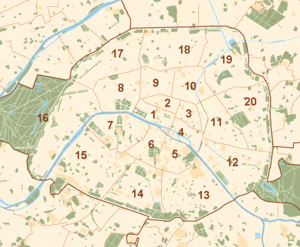Arrondissements of Paris
The twenty arrondissements (French: "rounding") are arranged in the form of a clockwise spiral, often likened to a snail shell,[2] starting from the middle of the city, with the first on the Right Bank (north bank) of the Seine.
[citation needed] Due to suburbanization, the population of Paris has gradually shifted outward, with only two arrondissements still growing.
Uniquely among French cities, Paris is both a municipality (commune) and a department (département).
The PLM Law set limits to the prerogatives of the mayor of Paris, who has to deal with the powers granted to the prefect of police on security issues.
In the late 1850s, Emperor Napoleon III and the Prefect of the Seine Baron Haussmann developed a plan to incorporate several of the surrounding communes into the Paris jurisdiction.
In 1859, Parliament passed the necessary legislation, and the expansion took effect when the law was promulgated on 3 November 1859.
When Haussmann released his plan for the new boundaries and numbering system, residents of Passy objected because it placed them in the new 13th arrondissement.
[5] In early 2016, mayor Anne Hidalgo proposed that the first four arrondissements should have their administrations merged.
[6][7] In October 2018, in a postal referendum, the town hall of the 3rd arrondissement was chosen to house the new shared administration.
In June 2020, the reform was implemented, the day after the second round of the 2020 Paris municipal election.

